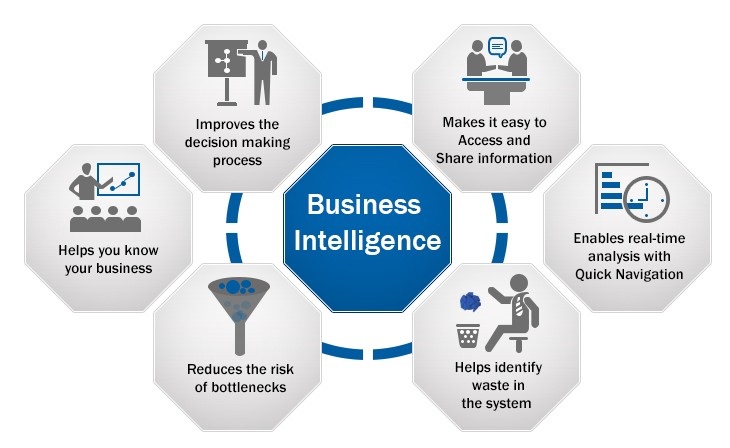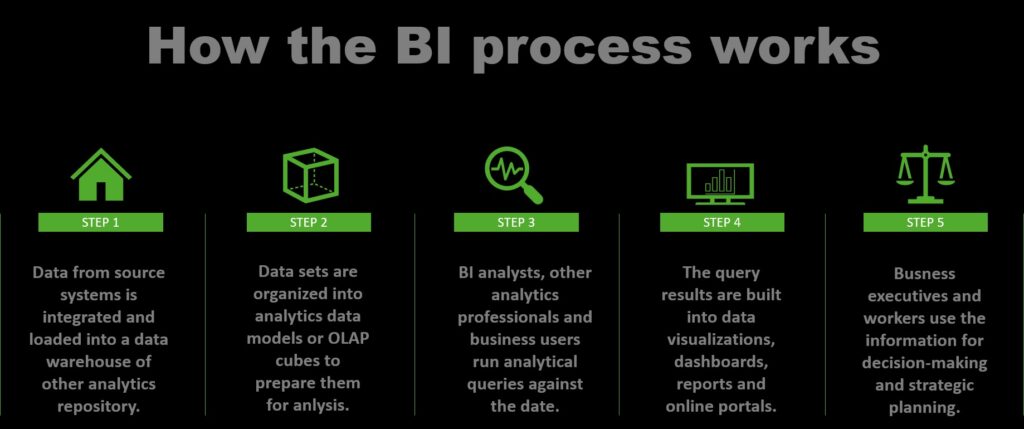Business Intelligence: All you need to know

Business Intelligence: All you need to know
What is Business Intelligence?
Business intelligence (BI) is a technology-driven process for evaluating data and delivering actionable information to leaders, managers, and employees to help them make better business choices. Organizations collect data from internal and external IT systems, prepare it for analysis, run queries against the data, and create data visualizations, BI dashboards, and reports as part of the BI process to make the analytics results available to business users for operational decision-making and strategic planning.
The ultimate purpose of BI projects is to drive better business choices, allowing firms to grow revenue, enhance operational efficiency, and gain a competitive advantage over their competitors. To do this, BI combines analytics, data management, and reporting technologies, as well as numerous data management and analysis approaches.
Why Business Intelligence Is Important?

Gain New Customer Insights: One of the key reasons businesses invest time, money, and effort in Business Intelligence is to improve their capacity to watch and analyse existing customer purchasing habits. Once you’ve used BI to understand what your customers are purchasing and why they’re buying it, you can use that knowledge to build goods and product upgrades that fulfil their expectations and demands, thus improving your company’s bottom line.
Improved Visibility: Because a BI system improves the visibility of these functions, Business Intelligent firms have better control over their operations and standard operating procedures. Skimming through hundreds of pages of yearly reports to gauge performance is a thing of the past. Business intelligence illuminates all parts of your business, making it easier to find opportunities for development and allowing you to be proactive rather than reactive.
Actionable Data: A successful Business Intelligence system identifies crucial organizational patterns and trends. A BI system also enables you to comprehend the ramifications of various organizational processes and changes, allowing you to make educated decisions and take appropriate action.
Efficiency Improvements: BI Systems assist enhance organizational effectiveness, which in turn boosts productivity and, perhaps, income. Business intelligence platforms enable organizations to easily communicate critical information across departments, saving time on reporting, data extraction, and data analysis. Making information exchange easier and more efficient allows firms to reduce duplicate roles and activities, allowing people to focus on their job rather than data processing.
Sales Insight: Both sales and marketing teams want to keep track of their customers, and the majority of them use Customer Relationship Management (CRM) software to accomplish so. CRMs are intended to handle all customer contacts. They include a plethora of data and information that may be evaluated and utilized to support strategic efforts since they house all consumer contacts and interactions. BI systems assist businesses in a variety of ways, including discovering new consumers, tracking and keeping existing ones, and offering post-sale services.
Real-Time Data: When executives and decision-makers must wait for reports to be generated by several departments, the data is prone to human error and risks becoming obsolete before it is even presented for review. BI systems give customers real-time access to data through a variety of tools like as spreadsheets, graphic dashboards, and scheduled emails. When using Business Intelligence technologies, large volumes of data can be swiftly and precisely absorbed, evaluated, and delivered.
Competitive Advantage:
In addition to all of these wonderful advantages, Business Intelligence may assist you in gaining insight into what your rivals are doing, helping your firm to make informed decisions and plan for future endeavours.
What is a Business Intelligence Process?

The initial stage in the BI process is to gather raw data from all available data sources. After that, the data is kept in a data warehouse or smaller data marts. Furthermore, data lakes may be used to store sensor data, log files, and other types of semi-structured or unstructured data.
The next stage is to use Data Quality Management and Data Integration technologies to clean, integrate, and consolidate data. Data must be translated into a form that allows them to be analysed. This is the step of data preparation. Following that, Business Intelligence Analysts and other experts do data analysis by asking questions, requesting ad-hoc reports, and so on. Finally, the query results are turned into reports, dashboards, data visualizations, and web portals. Business leaders use this essential data, which is now available in an easy-to-understand format, for strategic planning and decision making.
Define Business Intelligence (Tools and Techniques)
According to the Business Intelligence definition, BI is a phenomena that encompasses a variety of tools and technology. Its most important categories are as follows:
- Visualizations
- Dashboards
- Data mining
- Reporting
- OLAP (Online Analytical Processing)
- ETL (Extract-Transfer-Load)
Dashboards and visualizations are the most frequent of these since they give simple and clear data summaries. Understanding what Business Intelligence is will be meaningless without one analyses the instruments used to carry out BI. Let’s take a look at some of the most prevalent
Benefits of Business Intelligence
Here are some of the Top Advantages of Business Intelligence
- Faster analysis and reporting
- Improved data quality
- Improved operational efficiency
- Comparing data with competitors
- Valuable business insights
- Improvement in customisation
- Low costs or reduced overhead



 Shopify
Shopify